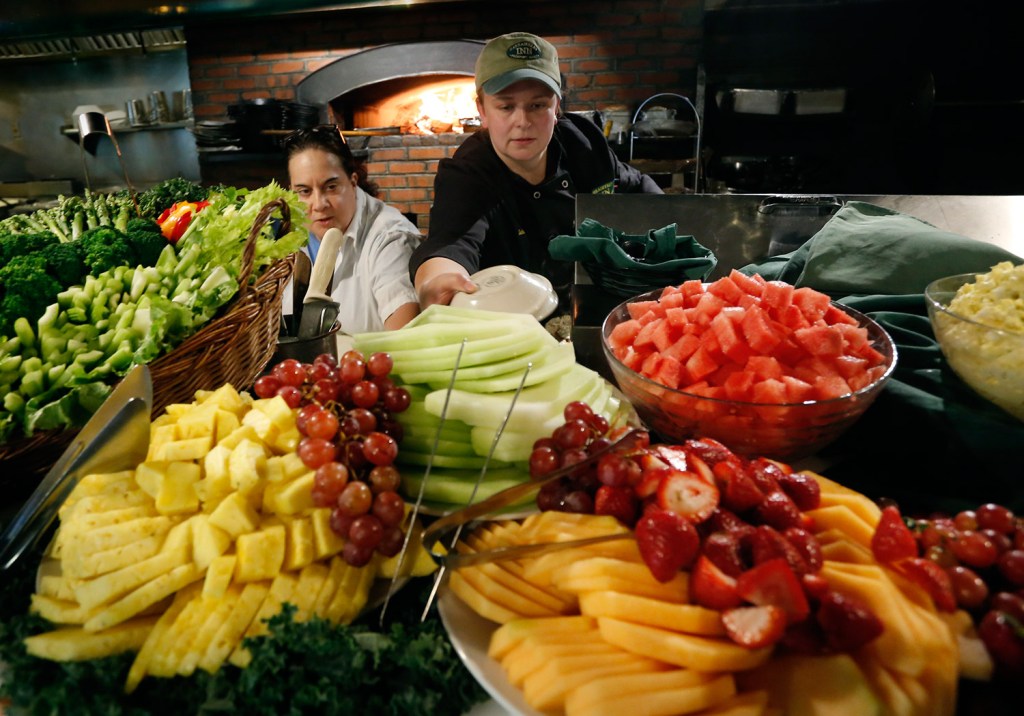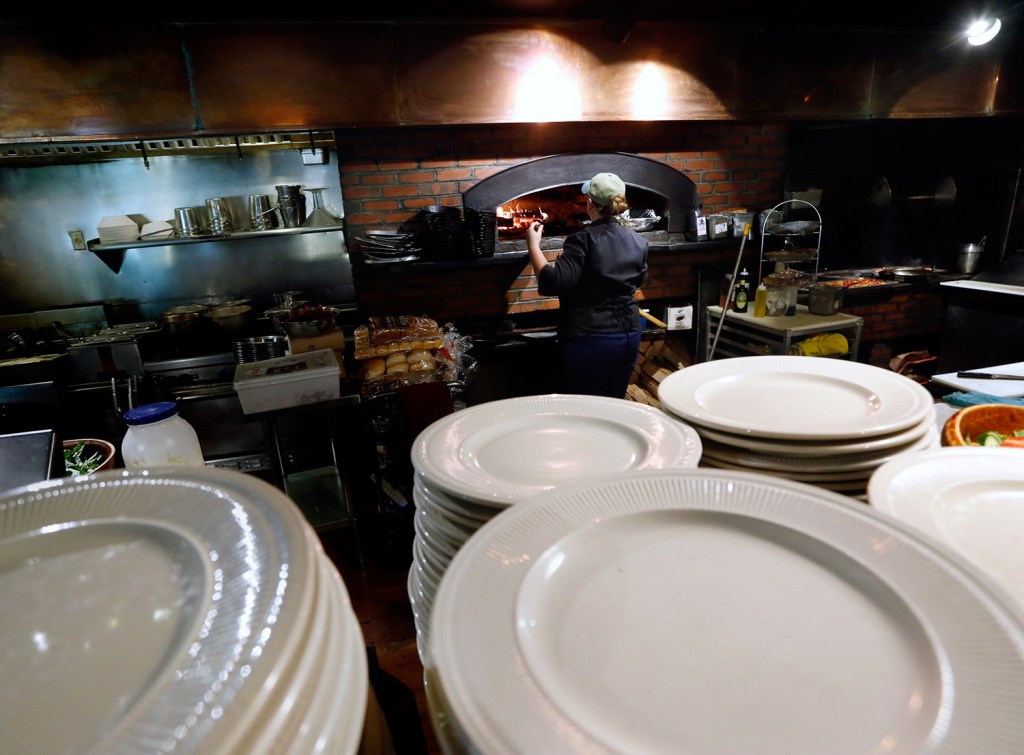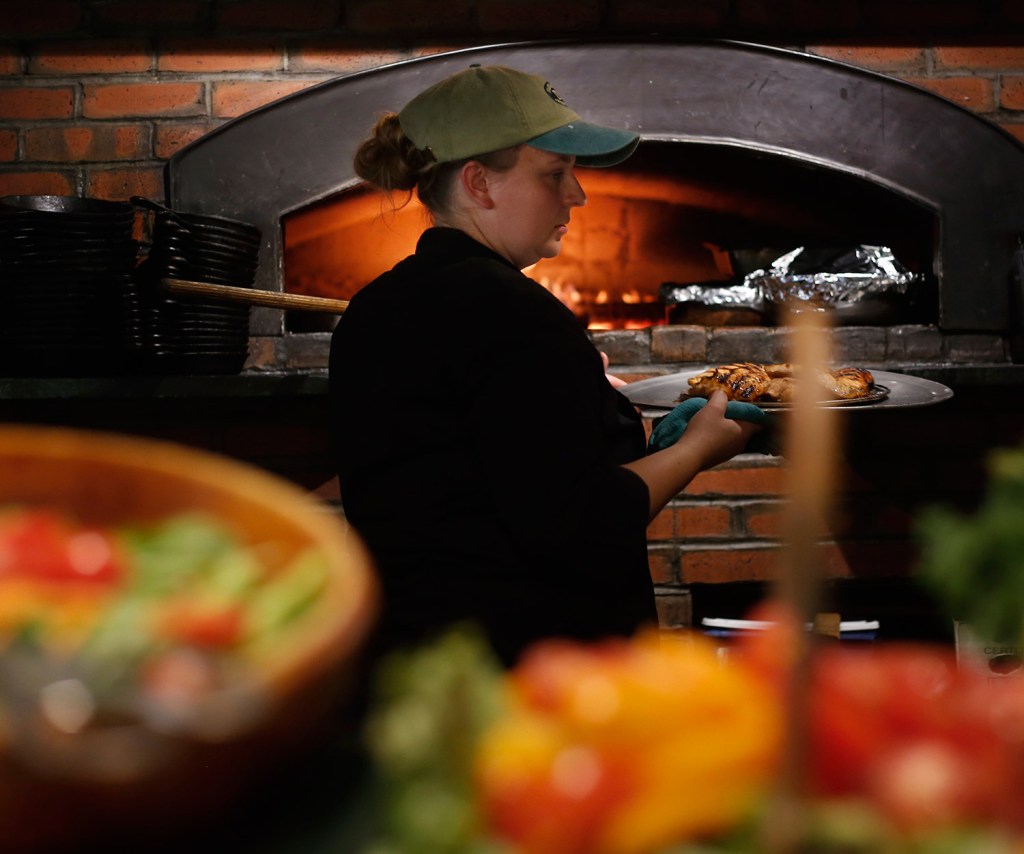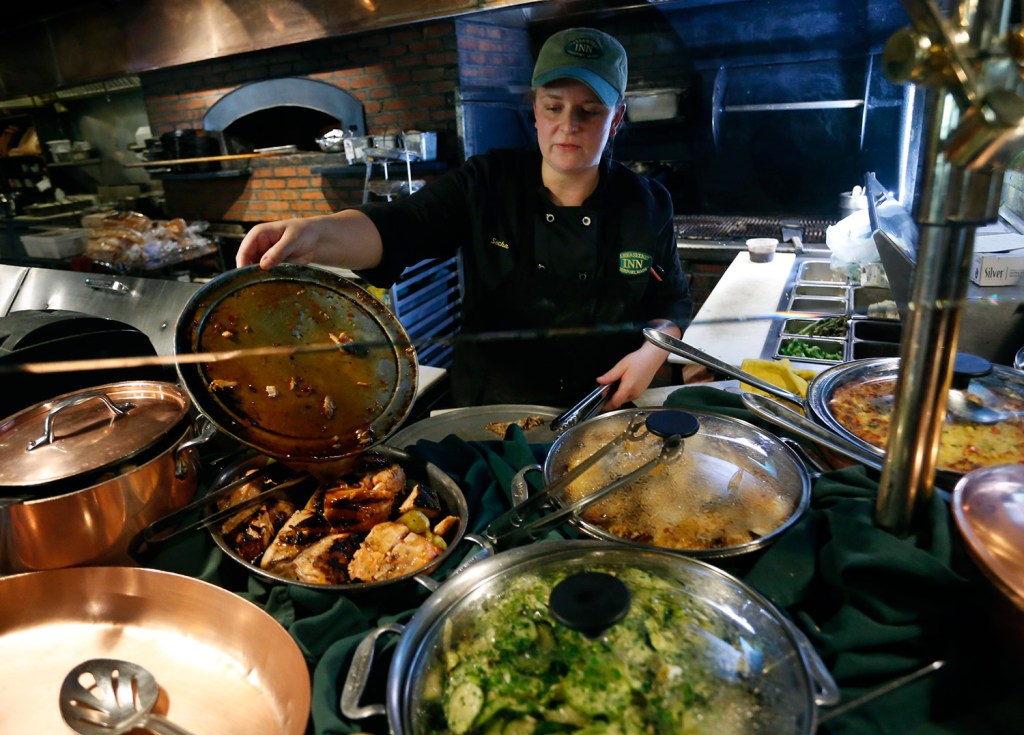Like most chefs, whenever executive chef Troy Mains interviews someone for a line cook position at the Harraseeket Inn in Freeport, he gets them in the kitchen and watches them work: Are their knives sharp? Are they clean? Can they communicate and take orders?
“It takes me an hour to look at them,” Mains said. “And then I say, in the most polite terms, ‘I don’t think it’s wise that we continue our relationship.’ Or I might say ‘Please, please, you’re hired. Oh, please, I’m begging you. Please work for me. Please.'”
Why the groveling? Because Mains and other chefs say a national shortage of qualified cooks is happening here in Maine, too, and leaving them chronically understaffed. Most say they started noticing a problem a year or two ago, and some say the current shortage is the worst they’ve seen.
According to the National Restaurant Association, job growth in the hospitality industry accelerated sharply last year, “a development that was out of sync with the pace of hiring.” Nationally, the number of restaurant cook positions is expected to grow by 175,000 jobs over the next decade.
In Maine, restaurant cook is one of the top 25 fastest-growing occupations, according to the Maine Department of Labor. The number of restaurant cooks employed in the state is expected to grow to 6,390 by 2022, nearly a 10 percent increase over 2012 employment.
But it’s not just a numbers game. There’s also been a cultural change in the kitchen. Chefs say a new generation of cooks, raised on Food Network shows, is often unprepared for the long hours and low pay that come with climbing up the restaurant industry ladder. Add to that a stew of economic and cultural factors, including the simple fact that there are more restaurants than ever in the United States – including Portland, Maine’s culinary capital.
In Portland, restaurant retail sales registered $296 million in 2014, a 10 percent increase over 2013, according to data from the Maine Office of Policy and Management.
Take into account the addition of even more seats at new restaurants and hotels popping up in the city, and “I would be very surprised if these numbers were not exceeded again,” said Greg Dugal, president of the Maine Restaurant Association.
In this kind of environment, the newest and hottest restaurants in town still attract plenty of cooks, but everyone else – even some of the more popular and well-established kitchens – is often left scrambling.
Mains, whose kitchen must turn out 150 lunches and 200 dinners a day but is currently four cooks short, said he has interviewed people just out of culinary school who can’t cut an onion or bone a chicken.
“There’s a decline in cooks, not just the amount but the quality,” Mains said. “When I was up and coming in the restaurant business, I can remember a stack of 50 resumes in a folder of people who wanted to work, and now if I hire four cooks, one works out.”
The lack of skilled cooks in the kitchen puts a strain on the rest of the staff, who must double up on duties to make up for the lack of bodies. “My sous chefs just take the overtime,” he said. “I can’t get the job done without them.”
Lou Kiefer, chef at the Bar Harbor Inn, puts ads in newspapers, contacts culinary schools nationwide, and scours every other source he knows, all year long, to fill his staff for the March-through-November season. This year, he filled about half of the 35 to 40 line cook positions he had available.
“It’s atrocious, and it’s only getting worse,” Kiefer said. “It’s tremendously hard to find staff. Right now, I am working six positions, including my own. I am working seven days a week. I will not get a day off until we close Nov. 9.”
SOME OFFER INCENTIVES
Petite Jacqueline is in the market for two full-time line cooks. Chef Frederic Eliot said the French bistro in Portland’s West End lost three line cooks to Central Provisions, nominated this year for Best New Restaurant by the James Beard Foundation, when it opened last year.
“I think the fact that we have so many restaurants opening in Portland all the time, the cooks are just bouncing around to every restaurant that’s opening,” he said.
Harding Lee Smith, who owns four restaurants in Portland, said he used to have a constant stack of resumes on his desk – so many that he would share them with other chefs who were looking for help. That pile has shrunk considerably, and the applicants he gets now tend to be people who have applied before and didn’t work out, or who are just filling out lots of job applications on Craigslist.
“The amount of cooks did not increase at the same rate the restaurants did,” Smith said.
In August, the height of the summer season, dozens of southern Maine restaurants posted listings for line cooks on Craigslist. They included casual spots like the Miss Portland Diner and Hot Suppa, and higher-end places such as Union and Miyake. The Portland Lobster Co. offered a $200 signing bonus. Mains, at the Harraseeket Inn, offers a “shoe incentive,” buying new hires proper footwear for the kitchen.
Some restaurants have increased starting pay, hoping to lure a cook with good skills. The average hourly wage of a restaurant cook in Maine is $11.91, according to the U.S. Bureau of Labor Statistics, but most starting wages are a dollar or two lower than that. When Jason Loring first opened Nosh Kitchen Bar in 2010, starting pay was $10 an hour. He’d watch how new employees developed, then bump them up to $11 an hour if they did well. Now he pays $12-$13 an hour to start.
At his other restaurant, Slab, Loring needs four cooks and a kitchen manager, and he can’t find anyone to fill the positions. “The only people I’m seeing are people who are just not qualified whatsoever,” he said.
Geoffrey Boardman, who runs the culinary school at Southern Maine Community College, tells his students not to accept anything less than $10-$12 an hour, especially in the Portland area, where the cost of living is higher. “A lot of students we’ve got are in their mid- to late-20s,” he said. “They’ve got cars to run and kids to keep.”
The thick stack of job postings on Boardman’s desk shows that what’s bad for restaurant owners is good for line cooks. The Englishman said this is the worst cook shortage he’s seen in the two decades he has lived in this country. Nearly 100 percent of his students, if they decide to stay in the business after they graduate, should be able to find a job, he said. If they can’t, “then there’s something drastically wrong.”
“Even the Convention and Visitors Bureau has been after me, saying, ‘We need more bodies from you,’ ” he said, “and I said, ‘You’ve got them all. They’re out there working.’ ”
SCHOOL ENROLLMENT DROPS
The situation has affected the school as well. Enrollment is down from a peak of 240 students a few years ago, when jobs were more scarce. There are just over 100 students entering classes this fall. Boardman says some students are going straight into the workforce, cooking in local restaurants where they are being trained by a working chef instead of developing their skills in school kitchens.
Some chefs say the expectations of people entering the occupation now are out of whack with the real world of restaurant work. This generation of workers grew up watching celebrity chefs glamorize life in the kitchen. They cheered home cooks competing for the title of chef over just a few episodes of a TV show. When they graduate from culinary school with little experience and lots of debt, they expect to work the hot line right away – for much more money than these jobs traditionally pay.
But, Eliot said, “They’re not good cooks. They don’t know what they’re doing.”
Eliot said he has seen cooks just out of culinary school who don’t know how to season their food properly and have poor knife skills. They are excited about exploring what’s trendy but are unfamiliar with the foundations of cooking. Some have no idea how to break down a fish or make a veal stock, he said.
Enrollment in culinary schools started expanding a few years ago, and with that came pressure to keep enrollment up. That pressure is partly to blame for the lack of skills in some new cooks, said Kiefer of the Bar Harbor Inn. He said when he went to culinary school, students had to prove they had worked in a hotel or restaurant for two years before they would even be considered.
“Now,” he said, “it’s ‘Hey, you know what? You cooked with your grandmother, come to school.’ ”
And younger cooks are rebelling against the old apprentice-style system of starting at the bottom and working their way up to earn the title of chef.
Under the more traditional system, cooks might stay with a chef for a year so that they can get to know the rhythm of a restaurant through the seasons, working their way through each station and learning as much as possible along the way. Today, chefs like Eliot feel lucky if their line cooks stay six months instead of walking out the door after three – or even sooner.
“A lot of times these guys set up times for tryouts and they don’t show up,” Eliot said. “That happens all the time. Or simply they start working and then they stop showing up. There’s a great loss in work ethic and respect for this profession. They just don’t care: ‘Whatever, I can go to the next restaurant and they’ll hire me.’ ”
NIGHTS, WEEKENDS, HOLIDAYS
Loring said that, when he opened Slab about a year ago and was looking to staff the place, he managed to line up 40 interviews for cooks. Only three applicants actually showed up.
The situation is different for hot new restaurants and those that have gotten a lot of national exposure. Andrew Taylor, co-owner of Hugo’s, Eventide Oyster Co. and The Honey Paw, says line cooks who are just moving to town looking for work, and those looking to move on from another Portland restaurant, often stop by one of his places first because of the restaurant group’s reputation. Taylor and Mike Wiley, one of his business partners, were nominees this year for the Best Chef: Northeast award from the James Beard Foundation, and Eventide Oyster has garnered a lot of national press over the past couple of years.
“We’ve had, in the past, a whole lot of difficulty staffing,” Taylor said. “It’s definitely been the No. 1 challenge. But this summer in particular has been really pretty easy. I think we’ve got the strongest staff we’ve ever had.”
Taylor said line cooks at his restaurants start at $12 an hour, and he and his partners try to treat them well by offering, among other things, health insurance and “elaborate staff meals” to breed loyalty.
Mains, on the other hand, has had trouble just finding people to fulfill a basic requirement of restaurant work – the willingness to work nights, weekends and holidays. He has offered to start cooks he likes at $15 an hour, but when he tells them they’ll have to work Thanksgiving, Christmas Eve and Christmas, they turn down the job.
“I understand there’s family constraints,” Mains said. “I have family. But people have a really warped sense of work ethic. Kitchen life is hard.”
A desire for “work-life balance” is more common now among cooks who have traditionally been expected to work odd hours and times when the rest of the world has the day off. Certainly there are more options for them in today’s food-crazy culture, such as high-end retirement homes, where residents expect good food for their money. Those organizations may provide higher pay, better benefits, hours more conducive to family life, and a shorter corporate ladder.
Eliot recalls working 100 hours a week for the first year after he graduated from culinary school. After he was done at his paying job in New York City, he’d go work in the kitchen at Le Cirque for free, just so he could learn from the French chef. He blames some of the new “crazy expectations” on TV shows that don’t show the reality of life behind the scenes in a restaurant, where cooks spend 12- to 14-hour days in a hot kitchen. “It can be brutal,” he said. “It’s a hard job. It’s not all fun. You have to be truly passionate to be a chef. I always tell the guys who work with me, if you are serious about this field, be ready that this is going to be your life. This is a lifestyle. This is not just a job.”
APPLICANT PANS OUT
Mains counted himself lucky two months ago when 25-year-old Graeme Sellers applied for one of his line cook positions. Sellers admits that his interest in cooking is a direct result of watching the Food Network. And he job-hopped not only from food job to food job, but from state to state. He started with prep work in Boston, making sandwiches and salads for a chain restaurant before moving to a pizza place. Then, last summer, he worked at an Italian restaurant in Montana for “a great chef.”
“That was a really good opportunity,” he said. “I got to cook for some celebrities while I was out there, and Montana is beautiful.”
But Sellers got tired of moving around and decided to move back home to Maine and set down some roots. He ended up at Applebee’s.
Mains saw potential in Sellers, so he decided to give him a chance. “He has a desire level higher than everybody else,” Mains said of Sellers. “He said ‘Show me how to make sorbet. Show me how to do pork belly. Show me how to do all these things.’ He has a thirst for knowledge.”
When Mains offered Sellers his choice of work at the inn, Sellers snapped up the opportunity to prepare food for the Maine Harvest Dining Room, the inn’s fine dining restaurant. He said he feels appreciated there, despite his lack of experience, and the staff has been very patient.
“Even now, I don’t have the greatest knife skills,” Sellers said. “It’s definitely something you learn and acquire. I’m getting a lot better.”
Mains prefers to train his own cooks, anyway. Plus, with a half-dozen or so positions open in the kitchen then, he needed the body.
Send questions/comments to the editors.






